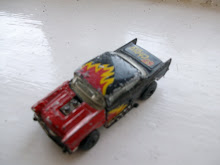What with having no interest at all (and even a mild contempt towards) the whole L.A. scene between the end of the 60s and the mid 70s, Warren Zevon quietly passed under my radar. Sure, I knew Werewolves of London, Lawyers, Guns and Money and Roland The Headless Thompson Gunner. I'd even heard some of his work in the latter period of his life: I Was In The House When The House Burned Down is a great song.
But that seemed enough, somehow. He was slightly tainted by association with my own prejudices. I mean, Mick Fleetwood and John McVie provided the rhythm track on Werewolves. Fleetwood Mac? Fuck off! But no matter, there'd been an inkling of wanting to find out more from reading a few articles before his death and when I got the chance to borrow I'll Sleep When I'm Dead: The Dirty Life and Times of Warren Zevon, I decided to take it.
"Dirty" being the key word here: narrated by Crystal Zevon, his wife through the 70s and mother to his daughter, it features interviews with the cast of people who drifted in and out of our man's life. And given that life covered being a songwriter for the Turtles, half of a folk duo and bandleader for the Everly Brothers before he got his own record deal, there's a lot of people involved.
From early on, he had an interesting life. The son of a gangster involved with some heavy people, he picked up on music quickly and even managed to talk to the composer Stravinsky on a couple of occasions in his youth. By the time we're in the late 60s, he's making a name as a songwriter and building up a solid alcohol habit that would build into horrific addiction by the 70s.
It's this side of his personality that is the most interesting throughout the first half of the book. Tales of his drinking binges are legion and shocking - it's amazing that he managed some kind of functionality as a working musician throughout this time. Apparently, shortly before his death he insisted his ex-wife write this book and leave nothing out, and she certainly doesn't. We see his at times petty personality, constantly getting into conflict with those who want to help his career, such as Jackson Browne. Most harrowing of all are the times he beats up his wife during his worst periods as a drunk.
It's this aspect that can make it hard to sympathise with Zevon as a human being. By his then wife's accounts, he was capable of hitting her, then passing out in a heap and remembering nothing when he woke up. In an equally dark moment, she confesses that in her own battle with a drink problem years later, she had hit their daughter with no memory of it when the drunken fog lifted.
Doubtless Zevon's alcoholism affected his career to the degree that after his second album Excitable Boy, his fortunes went into freefall that only a few albums later, he was dropped by his label, leaving him to sink further into his bad habits. Only an intervention by close friends and family sees him sober up, and even then after a few false starts.
Though the rest of the 80s and 90s, Zevon continues to play to a committed audience, still helped out by friends who remain loyal despite his at times testing personality. The drink problem being gone seems to help the emergence of a case of OCD, which he improbably shares with his neighbour - one Billy Bob Thornton. Girlfriends come and go, in no part due to his apparent addiction to shagging any woman who offers themselves.
Given the book starts with an account of his last moments alive from a close friend, by the time we reach the year 2000, the spectre of the terminal cancer that would kill him looms over. Faced with death, he returns to heavy drinking but still manages to record a final album featuring the likes of Bruce Springsteen (a long time admirer of his work). More importantly, he lives long enough to see the birth of his twin grandchildren.
I'll Sleep When I'm Dead: The Dirty Life and Times of Warren Zevon is not an easy read. It possibly shows how much someone can get away with when other people regard them as a genius. Has it made me want to hear more of his music? Perhaps, in the hope it can help me understand a very troubled man who still managed to touch a lot of people.
Subscribe to:
Post Comments (Atom)

No comments:
Post a Comment